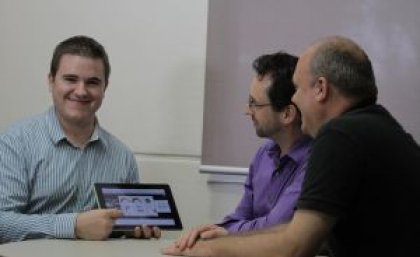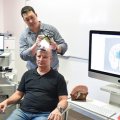
Meters displaying live data on home electricity consumption have become commonplace in recent years, but researchers are now seeking ways to deliver even more useful information to householders.
At The University of Queensland, Andrew Harvey — a graduate of School of Journalism and Communication — has won funding for his research project that aims to further empower consumers to save energy using real time interactive in-home displays.
Despite the Queensland Government's decision last week to scrap the ClimateSmart Home Service, it was inevitable that time-of–use charging for electricity would be introduced across Australia in the next decade, Mr Harvey said.
“Electricity will become relatively more expensive at peak times of day,” he said. “There will be an increasing demand from consumers for better information and techniques for lowering power bills and usage.”
Under the scrapped scheme, Queenslanders could pay $50 to have an electrician visit to advise on power-saving techniques and to install low-energy bulbs and an easy-to-read meter inside the home to raise awareness of electricity usage.
“Currently, household electricity bills arrive every three months, but they only deliver data, not information,” Mr Harvey said. “There is a big gap in communication. If this is addressed, consumers will be able to make better, more informed choices.
“A study in Europe showed there was an 8-12 per cent decrease in domestic energy consumption when energy displays were placed in people’s homes.
“We are developing a device that takes the data on how much energy a household consumes and uses interaction design to make it easy to understand and act on.
“Our real endgame is to help Australian households to save energy, money, and carbon emissions.”
SJC academics Dr Sean Rintel and Dr Richard Fitzgerald will advise on the research, for which Mr Harvey has won a UQ Research Scholarship that he will use to develop a Masters of Philosophy project.
Mr Harvey will undertake ethnographic field work on domestic energy usage and how people understand energy. It will include spending time with volunteer households, watching how they use electricity and how they take up energy-saving opportunities.
“I have been called the ‘energy detective’,” Mr Harvey said.
The project has already attracted recognition. Andrew and his brother Dr Michael Harvey, an entrepreneur and academic in UQ’s School of Mathematics and Physics, have founded a company, MH Energy Metrics, and received a Queensland Government What’s Your Big Idea Queensland? grant. The pair are using that grant to kick-start research and development of their device.
“Andrew was a pretty special undergraduate, with his excellent marks, entrepreneurial spirit, and industry experience,” Dr Rintel said.
“The MPhil will provide principled research training, a deep understanding of science communication, computer-mediated communication, and grounding in interaction design.
“SJC focuses on cross-disciplinary approaches to contemporary problems. Andrew is collaborating with the UQ School of Information Technology and Electrical Engineering and has already attended some courses.
“There is a huge capacity for commercialisation of this research; Andrew and Michael are already exploring this area.”
Mr Harvey began studying science and maths at UQ in 2007 but then changed to Bachelor of Communication, majoring in Public Relations, after completing an Introduction to Public Relations summer course.
“For me, the goal is to be a respected source of knowledge for engaging consumers using communication technology, and, in this case, giving people the tools to reduce their energy usage and carbon footprint,” Mr Harvey said.
Media inquiries: Siena Perry, UQ School of Journalism and Communication, ph 07 3346 3465, 0404 520556.
.jpg)










